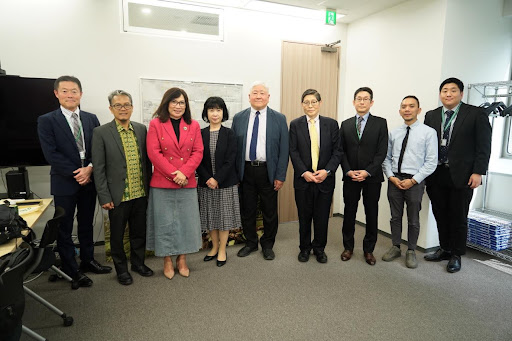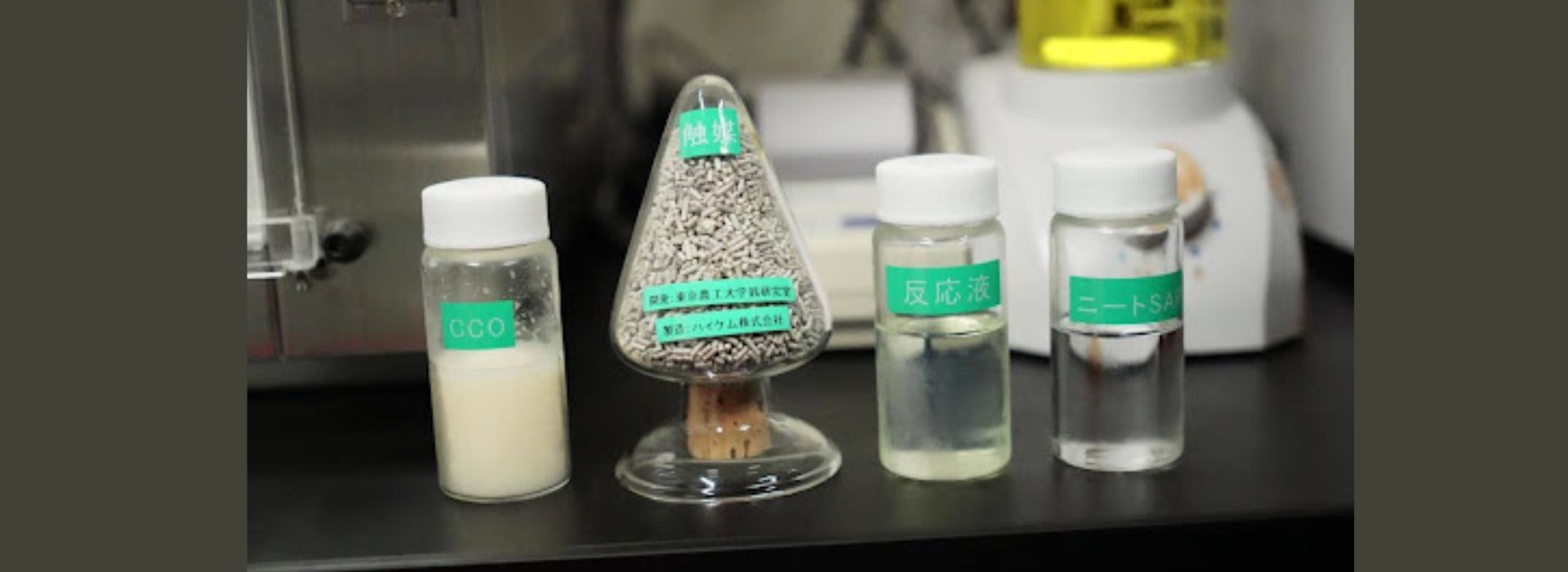Japan, a country long celebrated for its innovation, resilience, and deep respect for tradition, opened its doors this April to a series of transformative engagements that could reshape the future of the coconut industry on a global scale.
Leading this high-level engagement was Dr. Jelfina C. Alouw, Director General of the International Coconut Community (ICC), whose visionary leadership continues to bridge tradition with innovation, fostering strategic partnerships that advance scientific excellence, sustainable development, and global collaboration.

This important series of visits across Osaka and Tokyo was made possible through close collaboration with the Green Power Development Corporation of Japan (GPDJ) and the International Japan Business Network (IJBNET), under the support and facilitation of Mr. Suyoto Rais, Chairman of IJBNET. Their coordination was instrumental in connecting the ICC with leading Japanese industries, government agencies, and research institutions.
Throughout the engagements, the ICC delegation worked alongside key Japanese partners to strengthen coconut’s role in driving sustainability, food security, and renewable energy innovation.
Against the vibrant backdrop of economic dynamism and cultural excellence, these high-level discussions reaffirmed Japan's strategic importance as a partner for the future of the coconut sector. Industries, government bodies, and research institutions welcomed the opportunity to align efforts with the ICC’s vision of promoting innovation, empowering communities, and fortifying coconut’s contribution to global sustainable development.
The initiative represented more than just diplomatic outreach—it was a shared commitment to global solutions, recognizing that the coconut sector, long rooted in tradition, is now emerging as a vital force for sustainable growth, climate resilience, and inclusive economic advancement.
From Osaka’s booming industrial hubs to Tokyo’s corridors of government and academia, every meeting reflected a unifying vision: to embrace science, technology, and collaboration as the driving forces to secure coconut’s place at the heart of the sustainable industries of tomorrow.
Celebrating Innovation and Global Unity: Visit to Osaka Expo 2025 Site (Osaka)
The mission commenced with an inspiring visit to the upcoming Osaka Expo 2025 site, a monumental international exposition scheduled to open in April 2025 under the theme, "Designing Future Society for Our Lives."
Spanning futuristic architecture, sustainable design concepts, and groundbreaking technology showcases, Osaka Expo 2025 promises to be one of the world’s most significant platforms for reimagining health, environment, mobility, and human well-being. With over 150 countries and organizations participating, the Expo stands as a living symbol of global unity, creativity, and hope for a better tomorrow.
The visit served as a reminder that bold ideas, cooperative spirit, and innovation across all sectors — including agriculture and energy — are key to shaping the resilient societies of the future.
Building Stronger Supply Chains: Visit to Osaka Gas Chemicals (Osaka)

The discussions continued at the headquarters of Osaka Gas Chemicals Co., Ltd. (OGC), situated at Domecity Gas Building, Chiyozaki 3-chome-minami, Osaka. Led by Mr. Ryusaku Maeda, Team Manager of Procurement, the meeting highlighted OGC’s leadership in producing activated carbon from coconut shell charcoal, vital for environmental protection applications worldwide.
While Mr. Maeda outlined recent supply challenges caused by declining coconut production in key supplying nations, the dialogue was imbued with optimism and forward-looking strategy.
OGC reaffirmed its strong commitment to working collaboratively with coconut-producing countries to ensure long-term supply chain resilience. Initiatives discussed included support for replanting programs, strengthening farmer capacity, and developing sustainable sourcing partnerships.

The meeting underlined an important shift: industries are increasingly ready to invest not just in procurement, but in sustainable agricultural development, offering powerful opportunities to uplift rural communities and promote environmentally responsible growth.
Strengthening Sustainability Standards: Meeting with Sakamoto Yakuhin Kogyo (Osaka)
At Sakamoto Yakuhin Kogyo Co., Ltd., located in Awaji-machi, Chuo-ku, Osaka, strategic discussions unfolded with Director Shigeru Konishi and senior management. Specializing in high-quality oleochemical products and derivatives, Sakamoto Yakuhin emphasized that traceability and sustainability have become essential credentials for coconut products entering global premium markets.
Mr. Konishi called for the establishment of a global coconut certification system, modeled after internationally recognized sustainability frameworks. He stressed that proactive action is crucial to ensure that coconut products can maintain access to markets shaped by evolving regulations like the European Union Deforestation Regulation (EUDR).
Sakamoto Yakuhin’s advocacy reflects a broader shift within industries — a move toward greater transparency, environmental stewardship, and social responsibility that benefits both businesses and farmers.
A Coconut Pioneer’s Journey: Visit to Cocowell Ice Cream Shop (Osaka)

A refreshing and inspiring encounter followed at the Cocowell Ice Cream Shop in Naniwa-ku, Osaka, where President Yu Mizui — known as Japan’s “Coconutist” — shared his story of pioneering coconut culture in Japan.
Having introduced coconut oil to the Japanese market over two decades ago, Mr. Mizui emphasized how persistence, education, and a strong commitment to quality transformed initial skepticism into widespread acceptance.
Cocowell today stands as a respected brand for coconut-based health and lifestyle products across Japan, sold in department stores and organic outlets. By prioritizing smallholder farmer support, ethical sourcing, and premium product quality, Cocowell serves as a model of how social entrepreneurship and business excellence can coexist to drive sustainable growth.
Aviation's Green Revolution: Strategic Dialogue with Ministry of Land, Infrastructure, Transport and Tourism (Tokyo)

Transitioning to Tokyo, crucial discussions were held at the Ministry of Land, Infrastructure, Transport and Tourism (MLIT) headquarters in Kasumigaseki. Mr. Yasushi Yamashita, Director for Carbon Neutrality Promotion at JCAB (Japan Civil Aviation Bureau), led strategic dialogues on integrating coconut derivatives into the aviation industry's decarbonization efforts.
Japan’s government is actively advocating at ICAO for the inclusion of non-standard coconuts and Grade D copra in the Sustainable Aviation Fuel (SAF) positive list — a landmark move that could place coconut at the forefront of green aviation technologies.
The meeting underscored the growing importance of coconut as a renewable energy feedstock, offering benefits not only for environmental goals but also for smallholder farmers seeking new market opportunities.
Research and Innovation Partnerships: Tokyo University of Agriculture and Technology (Tokyo)
The delegation’s next stop was the Tokyo University of Agriculture and Technology (TUAT), a renowned institution blending scientific rigor with innovation.
At the Faculty of Technology, Professor Eika W. Qian shared insights into cutting-edge research using coconut oil as a superior feedstock for aviation biofuel, emphasizing its natural chemical advantages compared to other vegetable oils.
Meanwhile, at the Faculty of Agriculture, Dr. Sakae Suzuki outlined exciting opportunities for collaboration in coconut tissue culture technologies, which are vital to rejuvenating aging plantations and improving genetic diversity.
These discussions highlighted the role of academia in advancing coconut’s contribution to food security, climate resilience, and renewable energy.
Advancing Carbon Neutrality: Meeting with Green Power Development Corporation of Japan (Tokyo)

At the Green Power Development Corporation of Japan (GPDJ), conversations led by Executive Chairman Emi Sekiya and CEO Gen Kimitsuka explored opportunities to integrate coconut-derived byproducts, such as testa and non-edible copra, into the ICAO-COARSIA framework for sustainable aviation fuel certification.
The meeting stressed the need for robust standards and verification mechanisms, ensuring that coconut-based materials can become credible contributors to carbon reduction programs globally.
It also showcased how partnerships between the energy sector and agriculture can unlock new sustainable business models, linking rural development directly with international climate goals.
Conclusion
The visit to Osaka Expo 2025 served as a fitting symbol of the aspirations driving these engagements — a global celebration of innovation, sustainability, and collaboration aimed at building a better future for all. Set against the backdrop of one of the world’s most prestigious international expositions, the Expo’s grand vision of “Designing Future Society for Our Lives” echoed the very spirit of the dialogues held throughout Osaka and Tokyo.
Amid this atmosphere of optimism and global unity, the high-level engagements across Japan marked a pivotal milestone for the coconut sector’s global journey. From confronting raw material shortages and advocating for international certification standards, to pioneering research into coconut-based sustainable aviation fuel and advanced tissue culture, the meetings reflected a profound blend of tradition, cutting-edge science, and global diplomacy.
In Osaka, critical partnerships were strengthened with industry leaders working to secure sustainable supply chains and enhance the environmental credentials of coconut-derived products. In Tokyo, top government officials and eminent researchers outlined bold new pathways for integrating coconut into the world’s drive toward carbon neutrality and renewable energy.
The collective ambition demonstrated across industries, academia, and public institutions reaffirmed the coconut sector's expanding relevance — not just as a traditional agricultural commodity, but as a dynamic contributor to global sustainability, innovation, and inclusive economic growth.
As the world looks to Osaka in 2025 to showcase the very best of human ingenuity, the coconut industry stands ready to take its place in this unfolding story of hope, resilience, and transformation — charting a bold path forward toward a greener, fairer, and more prosperous world.

